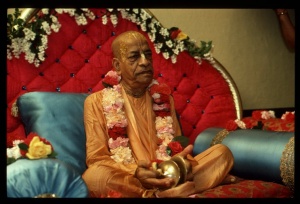SB 10.14.61: Difference between revisions
m (1 revision(s)) |
(Vanibot #0054 edit - transform synonyms into clickable links, which search similar occurrences) |
||
| (One intermediate revision by one other user not shown) | |||
| Line 1: | Line 1: | ||
{{info | {{info | ||
|speaker= | |speaker=Śukadeva Gosvāmī | ||
|listener=King | |listener=King Parīkṣit | ||
}} | }} | ||
[[Category:Srimad-Bhagavatam - Canto 10 Chapter 14]] | |||
[[Category:Bhagavatam Verses Spoken by Sukadeva Gosvami - Vanisource|101461]] | |||
<div style="float:left">'''[[Srimad-Bhagavatam]] - [[SB 10|Tenth Canto]] - [[SB 10.14: Brahma's Prayers to Lord Krsna|Chapter 14: Brahmā's Prayers to Lord Kṛṣṇa]]'''</div> | |||
<div style="float:right">[[File:Go-previous.png|link=SB 10.14.60]] '''[[SB 10.14.60]] - [[SB 10.15.1]]''' [[File:Go-next.png|link=SB 10.15.1]]</div> | |||
{{RandomImage}} | |||
{{SBnotice}} | |||
==== TEXT 61 ==== | ==== TEXT 61 ==== | ||
<div | <div class="verse"> | ||
evaṁ vihāraiḥ kaumāraiḥ | :evaṁ vihāraiḥ kaumāraiḥ | ||
kaumāraṁ jahatur vraje | :kaumāraṁ jahatur vraje | ||
nilāyanaiḥ setu-bandhair | :nilāyanaiḥ setu-bandhair | ||
markaṭotplavanādibhiḥ | :markaṭotplavanādibhiḥ | ||
</div> | </div> | ||
| Line 17: | Line 22: | ||
==== SYNONYMS ==== | ==== SYNONYMS ==== | ||
<div | <div class="synonyms"> | ||
''[//vanipedia.org/wiki/Special:VaniSearch?s=evam&tab=syno_o&ds=1 evam]'' — thus; ''[//vanipedia.org/wiki/Special:VaniSearch?s=vihāraiḥ&tab=syno_o&ds=1 vihāraiḥ]'' — with pastimes; ''[//vanipedia.org/wiki/Special:VaniSearch?s=kaumāraiḥ&tab=syno_o&ds=1 kaumāraiḥ]'' — of boyhood; ''[//vanipedia.org/wiki/Special:VaniSearch?s=kaumāram&tab=syno_o&ds=1 kaumāram]'' — the childhood age up to five years; ''[//vanipedia.org/wiki/Special:VaniSearch?s=jahatuḥ&tab=syno_o&ds=1 jahatuḥ]'' — they passed; ''[//vanipedia.org/wiki/Special:VaniSearch?s=vraje&tab=syno_o&ds=1 vraje]'' — in the land of Vṛndāvana; ''[//vanipedia.org/wiki/Special:VaniSearch?s=nilāyanaiḥ&tab=syno_o&ds=1 nilāyanaiḥ]'' — with sports of chasing about; ''[//vanipedia.org/wiki/Special:VaniSearch?s=setu&tab=syno_o&ds=1 setu]-[//vanipedia.org/wiki/Special:VaniSearch?s=bandhaiḥ&tab=syno_o&ds=1 bandhaiḥ]'' — with the building of bridges; ''[//vanipedia.org/wiki/Special:VaniSearch?s=markaṭa&tab=syno_o&ds=1 markaṭa]-[//vanipedia.org/wiki/Special:VaniSearch?s=utplavana&tab=syno_o&ds=1 utplavana]'' — with the jumping around of monkeys; ''[//vanipedia.org/wiki/Special:VaniSearch?s=ādibhiḥ&tab=syno_o&ds=1 ādibhiḥ]'' — and so on. | |||
</div> | </div> | ||
{{SBcollapse}} | |||
==== TRANSLATION ==== | ==== TRANSLATION ==== | ||
<div | <div class="translation"> | ||
In this way the boys spent their childhood in the land of Vṛndāvana playing hide-and-go-seek, building play bridges, jumping about like monkeys and engaging in many other such games. | In this way the boys spent their childhood in the land of Vṛndāvana playing hide-and-go-seek, building play bridges, jumping about like monkeys and engaging in many other such games. | ||
</div> | </div> | ||
| Line 31: | Line 36: | ||
==== PURPORT ==== | ==== PURPORT ==== | ||
<div | <div class="purport"> | ||
According to Śrīla Sanātana Gosvāmī, the word nilāyanaiḥ refers to games such as hide-and-go-seek or cops and robbers. Sometimes the boys would jump around like the monkeys in Lord Rāmacandra's army and then enact the building of the bridge to Śrī Laṅkā by constructing play bridges in lakes or ponds. Sometimes the boys would imitate the pastime of churning the ocean of milk, and sometimes they would play catch with balls. We can find full pleasure in the spiritual world, with the simple condition that everything be performed in pure love of Godhead, Kṛṣṇa consciousness. | According to Śrīla Sanātana Gosvāmī, the word ''nilāyanaiḥ'' refers to games such as hide-and-go-seek or cops and robbers. Sometimes the boys would jump around like the monkeys in Lord Rāmacandra's army and then enact the building of the bridge to Śrī Laṅkā by constructing play bridges in lakes or ponds. Sometimes the boys would imitate the pastime of churning the ocean of milk, and sometimes they would play catch with balls. We can find full pleasure in the spiritual world, with the simple condition that everything be performed in pure love of Godhead, Kṛṣṇa consciousness. | ||
</div> | |||
''Thus end the purports of the humble servants of His Divine Grace A.C. Bhaktivedanta Swami Prabhupāda to the Tenth Canto, Fourteenth Chapter of the Śrīmad-Bhāgavatam, entitled "Brahmā's Prayers to Lord Kṛṣṇa."'' | |||
</div> | |||
</div> | |||
SB 10.15: | <div style="float:right">[[File:Go-previous.png|link=SB 10.14.60]] '''[[SB 10.14.60]] - [[SB 10.15.1]]''' [[File:Go-next.png|link=SB 10.15.1]]</div> | ||
15. | __NOTOC__ | ||
__NOTOC__ | __NOEDITSECTION__ | ||
Latest revision as of 18:27, 17 February 2024

A.C. Bhaktivedanta Swami Prabhupada
Please note: The synonyms, translation and purport of this verse were composed by disciples of Śrīla Prabhupāda
TEXT 61
- evaṁ vihāraiḥ kaumāraiḥ
- kaumāraṁ jahatur vraje
- nilāyanaiḥ setu-bandhair
- markaṭotplavanādibhiḥ
SYNONYMS
evam — thus; vihāraiḥ — with pastimes; kaumāraiḥ — of boyhood; kaumāram — the childhood age up to five years; jahatuḥ — they passed; vraje — in the land of Vṛndāvana; nilāyanaiḥ — with sports of chasing about; setu-bandhaiḥ — with the building of bridges; markaṭa-utplavana — with the jumping around of monkeys; ādibhiḥ — and so on.
Translation and purport composed by disciples of Śrīla Prabhupāda
TRANSLATION
In this way the boys spent their childhood in the land of Vṛndāvana playing hide-and-go-seek, building play bridges, jumping about like monkeys and engaging in many other such games.
PURPORT
According to Śrīla Sanātana Gosvāmī, the word nilāyanaiḥ refers to games such as hide-and-go-seek or cops and robbers. Sometimes the boys would jump around like the monkeys in Lord Rāmacandra's army and then enact the building of the bridge to Śrī Laṅkā by constructing play bridges in lakes or ponds. Sometimes the boys would imitate the pastime of churning the ocean of milk, and sometimes they would play catch with balls. We can find full pleasure in the spiritual world, with the simple condition that everything be performed in pure love of Godhead, Kṛṣṇa consciousness.
Thus end the purports of the humble servants of His Divine Grace A.C. Bhaktivedanta Swami Prabhupāda to the Tenth Canto, Fourteenth Chapter of the Śrīmad-Bhāgavatam, entitled "Brahmā's Prayers to Lord Kṛṣṇa."